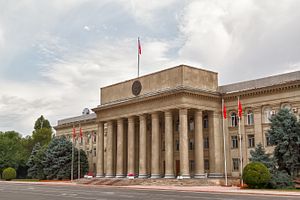Kyrgyzstan’s political and strategic value as a partner for the United States in Central Asia has waned as the transit center at Manas was closed and the U.S. combat mission ended in Afghanistan in 2014. The scrapping of a treaty with Washington almost as old as independent Kyrgyzstan itself over a diplomatic row last month (read more about that here) surprised regional watchers to an extent and can be viewed as a low point in the bilateral relationship, but it may be more of a case of the “mouse that roared” than a death knell for U.S.-Kyrgyz relations.
At a discussion hosted by George Washington University’s Central Asia Program, Erica Marat of the National Defense University, Eric McGlinchey of George Mason University, and Sean Roberts of George Washington University commented on the future of U.S.-Kyrgyz relations looking at the twin contexts of the recent diplomatic spat and the upcoming elections.
While none of the panelists could venture a solid guess on exactly why the State Department decided to choose Azimjon Askarov for a human rights defender award–as opposed to any other jailed Central Asian dissident (which one speaker remarked, there are plenty of)–they seemed to agree that Kyrgyzstan overreacted in canceling the 1993 cooperation treaty. What ultimately fueled that decision was also up for debate, a range of contributing factors were mentioned: elements of both a broader conception of Kyrgyz nationalism as well as notes of ethnic nationalism, the pervasive influence of Russian media outlets in stoking suspicion of the West, and a need to defend Kyrgyz dignity by pushing back at the U.S.
In part, the overreaction may be attributed to a misunderstanding that is fairly common, especially in the former Soviet Union, that there is more direction and intent behind such awards on the part of the U.S. government–that they are intended to send a specific meaning at a specific point in time. Roberts noted that “the governments in these countries perceive these things as having more direction behind them, as having a more conspiratorial approach. Like this is part of some kind of message.”
However, as Roberts later pointed out, there might be a silver lining in that Kyrgyzstan and the U.S. now have the opportunity to revamp and renegotiate the bilateral relationship, which is markedly different than in 1993 when the treaty was signed.
Kyrgyzstan has always been a special case in the United States’ relationship with the countries of Central Asia–but the U.S. hasn’t always given Kyrgyzstan the respect it feels it deserves. In comparison to its neighbors, Kyrgyzstan is a functioning parliamentary democracy, yet the aid and assistance it receives relative to countries like Uzbekistan does not reflect this reality (clarification: while true that Kyrgyzstan receives greater aid than Uzbekistan in strict numerical terms, transfers such as that of more than 300 MRAPs announced earlier this year convey a degree of prestige on Uzbekistan despite its terrible human rights record). In a month, Kyrgyzstan will hold parliamentary elections which Marat characterized as having “an element of unpredictability.”
What makes a democracy? McGlinchey said that what makes a democracy is both a “hot family feud” and having “leaders that actually believe in democracy.” In Kyrgyzstan, he said that the first is definitely present–there is lively political debate–but that the second is less clear. While many ordinary Kyrgyz believe in democracy, he said, “we don’t have leading politicians in Kyrgyzstan who actually believe in democracy. And what happens…it happened with Akayev, it happened with Bakiyev, I think it’s happening with Atambayev, is these people espouse democracy before they get into power and then they get into power and then they become autocrats.”
Roberts added that “there’s a question about whether a democratic system does need some chance to mature and whether some of the growing pains you also see in this is that a lot of Kyrgyz officials feel that the U.S. doesn’t give them the credit for that. That they don’t understand that yes, this is difficult.” He went to comment that perhaps part of the development of democracy is seen not just in the rising tide of nationalism but the trend of Kyrgyz politicians, who are not necessarily nationalists themselves, picking up on nationalist themes because that’s what sells in an election campaign.
The issues at stake in the upcoming election, Marat noted, will likely be mostly domestic–concerns about how to grow the economy and preserve Kyrgyz heritage (Marat hopes this doesn’t come branded as anti-Uzbek rhetoric but as a broader theme of Kyrgyz nationalism). The number of parties that ultimately are represented in the parliament is also a large question, with implications for how a government is formed. More concerning than even the ultimate outcome of the election, however, may be the process. Kyrgyzstan plans to debut a biometric data registration system for voting (more about that here) but has only spent a little over a year gathering data. About 20 percent of the working-age population is abroad, Marat said. For Kyrgyz migrant workers this has presented a particularly acute problem. Those in Russia, for example, needed to travel to a limited number of cities to register and then will have to do so again in order to vote. Many, Marat said, simply won’t bother voting.

































